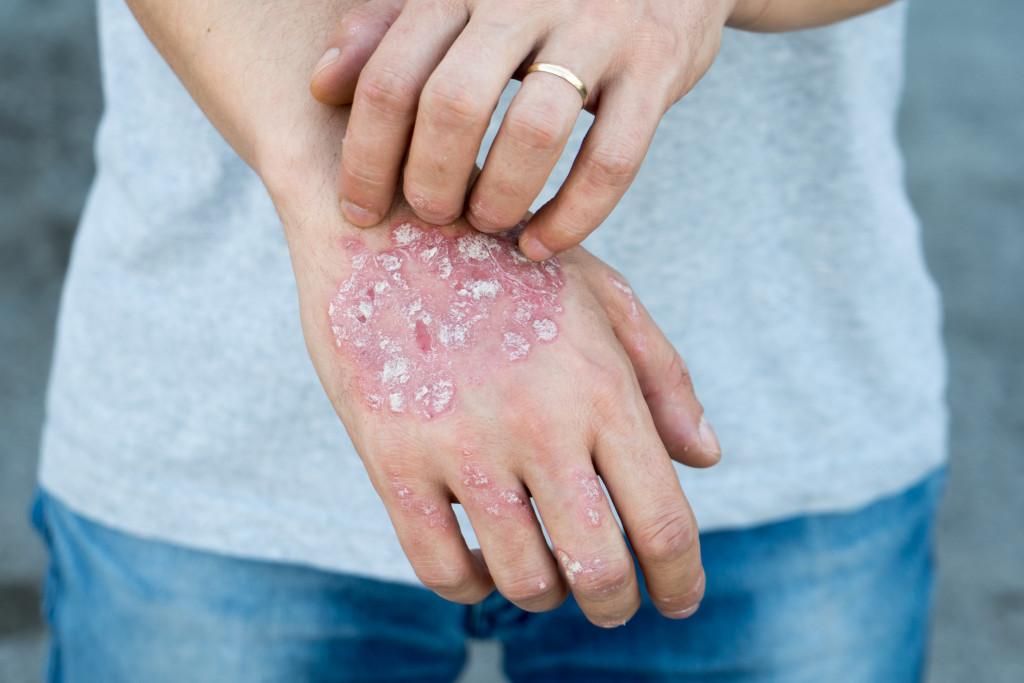- Psoriasis is a chronic autoimmune skin disorder that can significantly impact mental health.
- Psoriasis may result in depression, anxiety, social isolation, sleep disturbances, and negative body image.
- Living with psoriasis can lead to increased stress levels and a weakened immune system.
- Manage psoriasis through professional help, joining support groups, practicing self-care, seeking therapy, and education.
- Psoriasis is a complex condition, but individuals can lead fulfilling lives with proper care and support.
Psoriasis is a chronic autoimmune condition that affects millions of people worldwide. It is characterized by itchy, scaly skin patches that range from mild to severe. While psoriasis poses significant challenges for patients regarding physical discomfort and social stigma, it can also significantly affect their mental health. Here’s what you need to know about the disease, how it can affect you mentally, and how to deal with it.
What is Psoriasis?
Psoriasis is a chronic skin disorder resulting from an overactive immune system, causing the skin cells to grow acceleratedly. This rapid growth can lead to scaly patches on the skin, typically on areas such as the elbows, knees, scalp, and lower back.
While psoriasis is commonly known for its physical symptoms, it can also impact a person’s mental well-being. Here are some ways psoriasis can affect your mental health:

1. Depression and Anxiety
Psoriasis can lead to anxiety and depression, which can be attributed to the physical discomfort, low self-esteem, and social stigma associated with the condition. Studies have shown that psoriasis patients are twice as likely to develop depression and anxiety as the general population. It can affect their overall perception of themselves.
2. Social Isolation
Individuals living with psoriasis may feel self-conscious and embarrassed about their skin condition, which can lead to social isolation. Patients may avoid social activities, including intimate relationships, due to the fear of being judged or stigmatized.
3. Sleep Disturbances
Patients with psoriasis may experience sleep disturbances, including insomnia, which can further exacerbate their mental health. Sleep deprivation is known to increase levels of the stress hormone cortisol, which can lead to feelings of anxiety and depression.
4. Stress
Living with a chronic skin condition can be incredibly stressful, further impacting mental health. Work, finances, and family stressors can trigger psoriasis flare-ups, leading to more patient stress and anxiety. Chronic stress can weaken the immune system, making it even harder for patients to manage their psoriasis symptoms.
5. Negative Body Image
Individuals with psoriasis may struggle with a negative body image, leading to low self-esteem and feelings of unworthiness. This negative self-image can lead to a vicious cycle of isolation, depression, and anxiety.
Ways to Deal With Psoriasis
Thankfully, there are various ways you can deal with this disease. Here are five of those ways:

Visit a Professional
Someone must check your skin before anything else. An experienced dermatologist can confirm your diagnosis and provide treatment options tailored to your needs. They can also diagnose and treat any underlying mental health conditions affecting you. You should visit them before starting any treatment at home.
Join a Support Group
Support groups are excellent resources for individuals living with psoriasis. They provide a safe space to share your experiences, receive emotional support, and learn from others who have been through similar struggles. Connecting with others can help reduce feelings of isolation and improve mental well-being.
Practice Self-Care
Self-care is crucial for managing psoriasis and maintaining good mental health. This may include relaxing, engaging in enjoyable activities, practicing mindfulness, and getting enough sleep. It’s essential to prioritize self-care and find what works best for you.
Seek Therapy
Therapy can be beneficial for individuals struggling with the emotional impact of psoriasis. A therapist can provide a safe and non-judgmental space to address underlying issues and develop coping strategies for managing the mental health challenges associated with psoriasis.
Educate Yourself and Others
Educating yourself about psoriasis can help you better understand your condition and reduce negative self-perception. Educating others about the disease, including family members, friends, and colleagues, is crucial. Raising awareness and combating stigma can help create a more inclusive and understanding environment for those living with psoriasis.
Psoriasis is not just a physical skin disorder but also significantly impacts mental health. Understanding its effects on mental well-being and implementing effective coping strategies are essential for managing this chronic condition successfully. Remember to seek medical treatment, practice self-care, and seek support when needed. You are not alone in this journey, and with proper care and support, you can lead a fulfilling life despite psoriasis. So, keep your head up and never lose hope!

